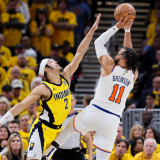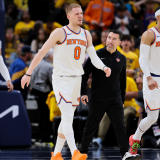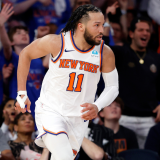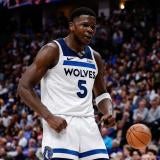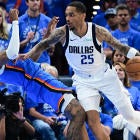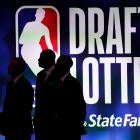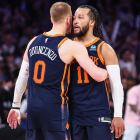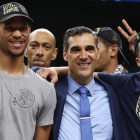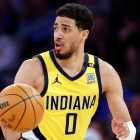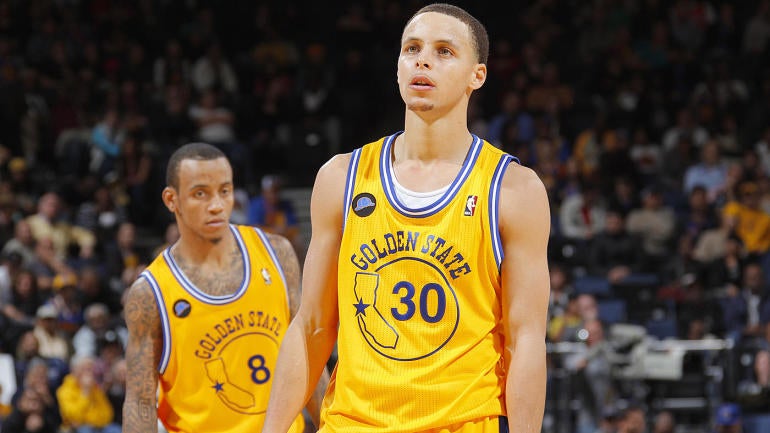
It's easy to forget how good Monta Ellis was for the Golden State Warriors. From 2007-12, there wasn't a defender in the league he couldn't get a bucket on. In just his second season after being selected 40th overall straight out of high school in the 2005 NBA Draft, Ellis started for the "We Believe" Warriors that upset the top-seeded Dallas Mavericks in the playoffs. He was named Most Improved Player that season. He was 21 years old. He was, as they say, the future.
Three years later, Ellis had become the league's sixth-leading scorer at 25.5 points per game, one of three seasons in which he registered among the league's top 11 scorers during his Golden State tenure. He was never an All-Star, and he certainly had his flaws. But he was certifiably beloved in the Bay.
So when the Warriors traded Ellis to the Milwaukee Bucks as the main piece that brought back Andrew Bogut in March of 2012, it was a big deal. It was seen, at the time, as an organizational choice between Ellis and Stephen Curry, who'd been drafted No. 7 overall by the Warriors in 2009. And in many ways, that's exactly what it was. Ellis had even been vocal about his doubts that he and Curry, both smaller scoring guards, could coexist in the same backcourt, and he wasn't wrong.
The league hadn't gone so collectively small at that point. A Curry-Ellis backcourt would've been long on defensive liability and short on offensive clarity. Current president and general manager of the Atlanta Hawks, Travis Schlenk, who was an assistant GM to Larry Riley with the Warriors when the Ellis trade went down, told CBS Sports that "Curry obviously needed room to blossom, but that's not the only thing that trade was about."
"You'd be incorrect to assume the Ellis trade was all about turning the team over to Steph," Schlenk said. "Yes, we felt like we wouldn't be able to win at the highest level with both those guys in the backcourt; it's just too hard to win with two small guards like that. And there certainly was a feeling that between the two, Steph fit our model better long term. He was definitely the guy long term for us. But nobody knew he would turn into the player he's become, and Monta had good trade value. So things lined up.
"But there was another whole part of that trade, which is that we knew we needed to get a defensive anchor at center," Schlenk continued. "We were trying to change the way we played. We wanted to get bigger. Tougher. We weren't getting anywhere just trying to outscore teams. So getting [Andrew] Bogut was a big part of that deal. Obviously in hindsight it's all about turning the team over to Steph, but people forget how big Bogut was in winning that first championship. That's where the defensive part of the equation really started to change. Sitting here today, I can't say that trade was more about giving Steph the team or getting that defensive anchor. It was both."
In the years since, there have been retrospective rumors that the Warriors actually offered Ellis or Curry to the Bucks, who chose Ellis because of Curry's injury concerns. Schlenk denied trading Curry was ever a consideration, and that rumor has been pretty sufficiently debunked. Either way, it worked out for the Warriors, whose dynastic ascent has been littered with good fortune.
For starters, the Warriors wouldn't had landed Stephen Curry in the first place had the Minnesota Timberwolves not passed on him not once, but twice in the 2009 draft. First the Wolves took Ricky Rubio at No. 5, then another point guard in Jonny Flynn at No. 6. Golden State was waiting at No. 7 for Curry, who was actually hoping to fall to the New York Knicks at No. 8. Curry's father, Dell, has since admitted he told the Warriors not to draft his son.
They didn't listen, and from there there the dominoes started falling into place. After the Ellis trade, the Warriors lost 22 of their final 27 games to salvage their top-seven protected pick in 2011, which would've gone to the Utah Jazz had it fallen even one more slot. They used the pick on Harrison Barnes. The next year they got Klay Thompson and Draymond Green. Then-head coach Mark Jackson ushered in a commitment to defense, Curry became a star, and in 2013 the Warriors crashed the playoff party with a first-round upset of the third-seeded Denver Nuggets.
That series made an impression on Andre Iguodala, who signed with the Warriors a few months later after they were able to unload the contracts of Richard Jefferson, Andris Biedrins and Brandon Rush on the Jazz in something of a bad-salary-dump miracle. An MVP for Curry and a championship came in 2015. Another MVP for Curry and a 73-win season in 2015-16 followed.
Golden State lost in the Finals to LeBron James and the Cleveland Cavaliers that year, becoming the first team in Finals history to blow a 3-1 series lead, but even that worked in its favor as Kevin Durant has gone on record saying he wouldn't have signed with the Warriors had they won that championship. When you win even when you lose, that's when you know the dice are rolling your way.
In fact, Durant wouldn't have been able to sign there anyway had Curry not been on the biggest bargain contract in all of sports. Shortly after the Ellis trade, the Warriors signed Curry to a four-year, $44 million deal, which at the time felt like a sizable gamble given Curry's recurring ankle injuries that were threatening to ruin his career.
Instead, surgery fixed Curry, and the Warriors were suddenly armed with a future MVP and flush with funds. Under any ordinary circumstances, a team gets one or the other. Golden State got both. The final piece fell into place in 2016, when the salary cap ballooned after a $24 billion TV deal just happened to kick in the same summer Durant became a free agent.
Two more championships and another Finals berth ensued.
It's not to say the Warriors didn't earn their five Finals berths and three championships. Any successful endeavor involves a certain amount of luck, but Golden State, for the most part, made its own fortune tracing back to the decision to trade Ellis and officially turn the team over to Curry.
It wasn't necessarily the most popular decision at the time among their fans. A big chunk of Golden State's contingent thought the team made the wrong move. Curry was very good, the runner-up in the 2010 Rookie of the Year race, but Ellis was their guy. A top-10 scorer in the league.
In the aftermath of the move, Joe Lacob, who had just bought the team, was roundly booed in a now infamous scene during Chris Mullin's jersey retirement, to the point that Warriors legend Rick Barry had to address the crowd. The heat was on Curry to validate what was a legitimately controversial decision to hand him the keys to the franchise. In a recent interview with SLAM magazine, Ellis revealed a phone call he made to Curry to help ease his tension.
"I had just got traded to Milwaukee. The fans were upset. Then they had this Chris Mullin night, where they retired the jersey or whatever, and they booed the owner," Ellis said. "I think that kind of got to him because everybody was talking about me more than anything. A lot of people were saying they would've taken me over him. Being young, sometimes that'll get to you. And I understood it. So I just called him and told him, 'Don't worry about all of that, man. Just keep working hard. You're in a great situation, it's your team. There are going to be critics. You're going to have people that are going to say what they're going to want to say. Once you turn it around, I guarantee they are all going to be on your bandwagon.'"
Suffice it to say, Ellis was right. And so were the Warriors.








